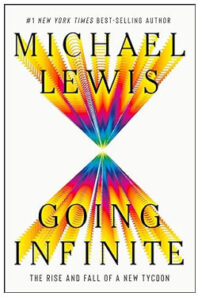 Review by Myra Salzer
Review by Myra Salzer
I never expected to find myself speaking in support of Sam Bankman-Fried, but after reading the book, I now have deep empathy for him. Author Michael Lewis portrayed him as a brilliant yet eccentric individual, while the press and prosecutors painted him as a villain. The book’s description led me to believe that SBF might be on the Asperger’s spectrum, although this was never explicitly mentioned.
My initial interest was in Michael Lewis’s newest book, as he’s known for works like “The Big Short” and “Liar’s Poker.” Lewis began collecting information on SBF without knowing that Alameda Research and FTX would eventually go bankrupt. Despite me knowing the outcome beforehand, it was akin to watching a movie like Titanic, where the journey to the inevitable ending is captivating.
SBF was always an unconventional character who didn’t quite fit in socially or emotionally. He grew up in a privileged, intellectual environment in Palo Alto, where both his parents were professors at Stanford. It wasn’t as though he struggled to make friends, he just wasn’t interested. He enjoyed playing games far more than socializing. He did make a friend when he attended a math camp during his high school years, and later found a connection at MIT with a classmate who ultimately joined his firm.
I gained insights into cryptocurrencies and exchanges, though not enough to fully explain them. More importantly, I learned how someone with good intentions but limited social skills could navigate their way into severe legal and financial troubles, affecting hundreds of employees worldwide. Global investors included people from all walks of life, from billionaires and venture capitalists to individual inheritors and philanthropists.
The book paints the prosecutors in the bankruptcy case as narrow-minded, self-important individuals who lack a true understanding of the industry. The media’s amplification of negativity in the case is evident. While incompetence and a lack of experience were present among SBF and his mostly young employees, intentional fraud doesn’t seem to be part of the equation.
I highly recommend this book. It’s fascinating how quickly FTX and Alameda Research expanded and then collapsed in such a short period. They handled enormous sums of money, which I couldn’t comprehend, and it appears many employees couldn’t either. Nevertheless, just like many of TWC’s philanthropic inheritors, they aimed to be “effective altruists” with noble intentions to improve the world.
Interestingly, most of the funds initially missing have been recovered, though this doesn’t receive much attention and doesn’t seem to influence SBF’s prosecution.